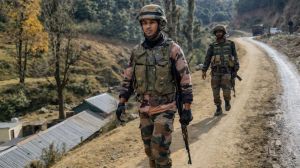There is a Solomon-like solution somewhere8217;
Long seen as the poor cousin among the half-a-dozen regional State Department bureaus, the South Asia division was galvanised by India's ...

Long seen as the poor cousin among the half-a-dozen regional State Department bureaus, the South Asia division was galvanised by India8217;s second round of nuclear tests in May last year. The fifth-floor rooms of the bureau in the dull grey building in Washington8217;s Foggy Bottom is a beehive of activity. On the sixth floor, Assistant Secretary of State for South Asia Rick Inderfurth is in a constant flurry of meetings as the biggies, from President Clinton to National Security Advisor Sandy Berger to Secretary of State Madeleine Albright, have suddenly decided they need to minister urgently to the region.
Inderfurth met Indian Express Washington correspondent CHIDANAND RAJGHATTA to discuss the future of Indo-US relations after Kargil. Excerpts:
What is happening on the Indo-US relationship front? Is there a shift, as many people seem to think, stemming from the Kargil episode?
With Kargil, we called it as we saw it. Hopefully, in the future, it will be the same. We were quite clear inour statements from the White House and the State Department on how we viewed the situation and we worked very hard to take the steps to resolve it. We certainly have noticed that the Indian press has focused on the shift. For me, this goes back to the time I took office, when we decided to move India and the US away from an estranged democracies situation to a stronger relationship in the 21st century. This is what the President has been saying consistently, going back to his first meeting with Prime Minister Gujral.
Are you saying it is a continuation8230;
It is a continuation. We believe the position we took on Kargil was the right one. It came about because of the violation of the line of control. We applaud the Indian government for the restraint it exercised despite the difficulties, despite the tragedy of losing lives. The Prime Minister has our admiration for not allowing the situation to escalate or get out of control.
Foreign Minister Jaswant Singh has said in his speech and we readMinister Singh8217;s speeches very closely that there were certain principles laying out India8217;s objectives. Number One: Pakistan8217;s armed intrusions in Kargil will be evicted. The armed forces will take all necessary action on the Indian side of the LoC. This is commendable restraint in the face of provocation.
It is clear that certain principles guided Indian policy and we expect the government to adhere to them. I think they have served India very well in the international community. We very much admired the way this was handled, as well as the willingness to return to the Lahore process. So I don8217;t see this as a shift but a continuation of a policy of engagement.
One reason many folks read a shift in the situation is that the US has not always called it fair in the region.
During my tenure, we have done it right and fair the whole time. I cannot speak for those who preceded me. That8217;s history. We are in a new era, in an era where we want broader relations with the region. In a more seriousfashion, I realise that at various times in our history India has felt we did not take the right decision about crises. I don8217;t want to reopen those pages of history. I do believe his latest crisis is one that has shown our willingness to look at these issues and call it like we see it.
About the Lahore process, India feels there has been a betrayal. Is there pressure from the US to restart talks, and how soon do ou expect that to happen?
As soon as it can be productive. How soon that happens will have to be determined by the parties themselves. Many of us who watched the Lahore summit with a great sense of hope were disappointed by the happenings so soon after the declaration. If we outsiders were disappointed, I can imagine the depth of disappointment for the insiders. At the same time, there is no question that these issues must be addressed or there will be further crises down the road. These issues are not going to go away. There is no question of pressure from us, but we are encouraging theprocess.
What is the payback for a country which waged war and sought to change the status quo by force?
Payback? Pakistan has not been well served by this episode. Those who have taken steps to resolve this crisis deserve a great deal of credit for moving away from the possibility of greater confrontation. This episode makes it clear that the path to resolving the Kashmir dispute is by talks and not attempting to change the situation and not through military action.
Do we look back or look forward on Kashmir? Does it make sense to go back to the UN resolution?
I think it is important to look forward. I am not suggesting that one should not take into account the past. There is a long, tortured history. But for a long-term solution, one must look to the future to seek a settlement that will be acceptable to New Delhi and Islamabad, and take into account the Kashmiris. It will be difficult to do that, but not impossible. There is a Solomon-like solution somewhere.
The parties themselveswill be able to arrive at that. There can be a supporting role for the international community for encouraging the process, not mediating. The fact is that this administration cares about this and the President has a personal interest. He has a high regard for the region and wants to see it fulfil its potential. I think the statement of his intent to travel to South Asia in the joint statement points to the direction he is moving.
Is the President8217;s visit now delinked from non-proliferation? Where do we stand on the Test Ban Treaty?
We will certainly await India8217;s decision on this issue. We recognise that the statement made by Prime Minister Vajpayee at the United Nations last September must take into account the electoral realities in New Delhi. We hope that as soon as the new government is formed it can turn its attention to the issue. We will continue to make the case that signing the CTBT is in India8217;s interest. As soon as the new government is formed, we want to re-engage on those issues.
Interms of the President8217;s trip, we want to see it take place in the most positive environment possible. There are certain steps India can take to create this environment and we recognise there are certain steps we can take also.
- 01
- 02
- 03
- 04
- 05






























